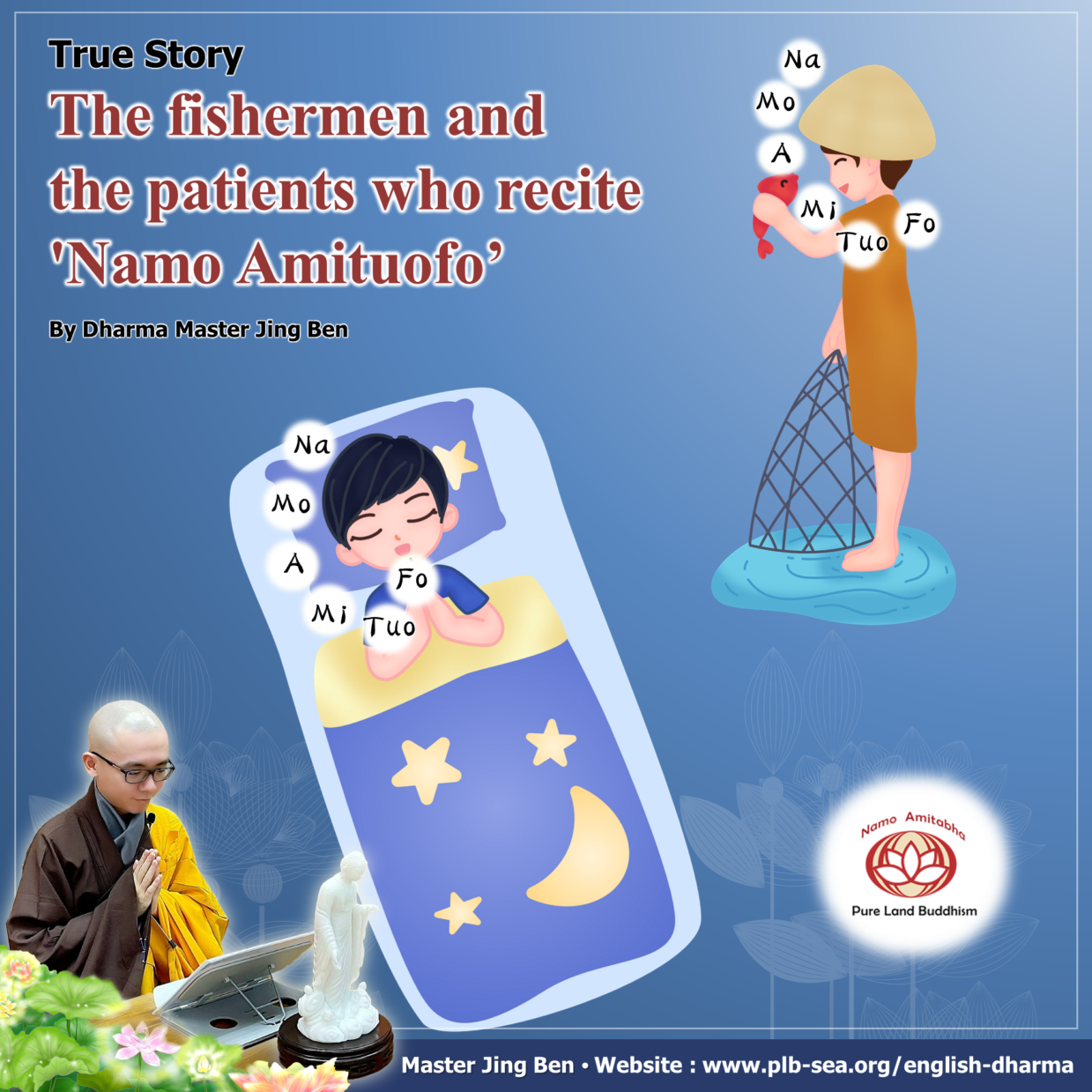The fishermen and the patients who recite 'Namo Amituofo'
By Dharma Master Jing Ben
Recorded in "The Compendium of the Miracle of Triple Gems", it is mentioned in the ancient book that a long time ago on an island in ancient Sri Lanka, there dwelled the islanders who were fishermen by trade.
One day, the sea was swamped with a shoal of fish. The most remarkable thing was that all the fish could recite 'Namo Amituofo'. Yes, the fish were able to recite Amitabha's name! Seeing such an unusual spectacle, the fishermen chanted 'Namo Amituofo' along with the fish.
Amazingly when the fishermen chanted 'Namo Amituofo', the fish would swim nimbly towards them, making no attempt to flee even if they were to be caught. In addition, the fishermen also found that the more they recited 'Namo Amituofo', the tastier the fish. In contrast, for those fishermen who chanted very little or didn't recite at all, the fish that they caught tasted awful.
The islanders are smart as a whip. Seeing how those fishermen who recited 'Namo Amituofo' were rewarded with tasty fish while those who didn't end up with awful catch, they realised that the savouriness of the fish was the result of Amitabha-recitation. Since the islanders loved to eat delicious fish, they recited 'Namo Amituofo' with all their might. They had no inkling of who Amitabha Buddha is. And neither were they aware of the purpose of Amitabha-recitation. They only knew that Amitabha-recitation ensured an abundant supply of delicious fish.
With the passage of time, one of the oldest islanders who first caught and ate the fish passed away. Among all the fishermen, he was the one who ate the most of the Amitabha-fish. In fact, he was the first batch of fishermen who caught the Amitabha-fish.
According to the law of causative karma, he had committed a grave sin by killing large amounts of fish on a daily basis. That would inevitably land him in the three woeful realms. However, three months later this old man revisited the island. Unbelievably, he was riding on iridescent clouds.
He told the islanders, "I'm among the first who caught and ate the Amitabha-fish. With the compassion of Amitabha Buddha, as well as the merits and virtues of reciting 'Namo Amituofo', I was reborn in the Land of Bliss when my life ended." He added, "If you don't believe, go and have a look at the fish bones that we have discarded, and you will understand."
Upon hearing this, the islanders rushed to look for the fish bones they had thrown away. To their astonishment, all the bones had turned into lotus petals! Isn't this incredible? When human beings pass away, even our bones will not turn into lotus petals, not to mention the fish bones.
The islanders knew from the sight that something spectacular had just unfold before their eyes. In fact, these Amitabha-fish were manifestation by Amitabha Buddha to encourage the islanders to recite 'Namo Amituofo' so that they can be liberated from Samsara. Without this special manifestation, they wouldn't know how to recite Amitabha's name and would have fallen into the woeful realms as a matter of course. This expedient means enabled them to be reborn in the Pure Land at the end of their life.
Therefore, there is a parable in Buddhism saying, "Just like the honey, it tastes sweet on every part." In other words, whichever part of the honey we have tasted, they are equally sweet. Similarly, whatever cause-and-condition makes us get to know ‘Namo Amituofo’, only positive results can come out of it. There will never be any undesirable outcome.
As can be seen from the story of Amitabha-fish, the islanders recited 'Namo Amituofo' for the sake of getting delicious fish to eat, not knowing the true benefits of Amitabha-recitation. However, so long as they recite 'Namo Amituofo', they are connected with Amitabha Buddha who will liberate them from the cycle of birth and death.
In fact, the unwholesome deeds of killing and eating fish have dire karmic consequences. However, here in the story, the islanders were reborn in the wonderful Land of Bliss instead. Of course, we are by no means encouraging the killing and eating of fish freely. Instead the aim (of the story) is to make us feel inspired by Amitabha Buddha's compassion and the remarkable power of Amitabha-recitation. The parable of the honey, that tastes sweet on the middle and sweet on the outside, shows that Amitabha Buddha's deliverance, likewise, is thorough and all-embracing. We have to come to the realisation that by reciting the name of Amitabha Budha, the benefits of the name, like the honey that does not lessen its sweetness on the middle or the outside, remain effective in whatever dire circumstances we might be in and will not be hindered by the severity of our karma.
There is a contemporary incident which is also very unique. Dr. Zhao, a Traditional Chinese Medicine practitioner shared that he has absolute faith in Amitabha-recitation. His faith doesn't stem from reading widely but was inspired by the positive results he has seen in his patients who have benefited from reciting Amitabha's name.
According to him, these are the patients where traditional treatments fail. They suffer from severe insomnia or have frequent dreams of deceased relatives and persistent nightmares. These special groups of patients benefit most from reciting 'Namo Amituofo'.
He said introducing Amitabha-recitation to these patients works better than the traditional medical treatments he usually uses. His usual sleep inducing technique for those insomnia patients is "counting sheep ". 1 sheep, 2 sheep, 3 sheep...when you have trouble sleeping, count the sheep till you get tired and fall asleep. However, it was ineffective for most patients. Some of them counted 1000 sheep till the next morning and still couldn't sleep.
Subsequently, Dr. Zhao learned that reciting 'Namo Amituofo' is very easy and remarkable. So he decided to give it a shot. He asked these special groups of patients to recite 'Namo Amituofo' and the effect was surprisingly good.
He said he was most impressed by a particular patient he met. This patient has an abnormal blood pressure and often dreams of his deceased loved ones at night. Each time he would wake up feeling very tired and eventually fell ill. Yet he couldn't have proper rest as he still had recurring dreams of his deceased loved ones. It was a vicious cycle.
At that time, Dr. Zhao already had experiences with the efficacy of Amitabha-recitation, so he advised the patient to recite Amitabha's name. But the patient said he was an atheist and didn't believe that. Dr. Zhao was very wise. He said, "I'm not asking you to believe anything, I'm just asking you to recite the Buddha's name. It's like taking medicine. I prescribe the medicine, and you just eat it, that's it. Believe it or not, that's another matter. You can just treat reciting 'Namo Amituofo' as a medicine. I'm not asking you to do anything else."
The patient, who was an atheist, thought it was reasonable and agreed to give it a try. So he began to recite 'Namo Amituofo'. A few weeks later, he turned up for a follow-up consultation and Dr. Zhao asked him about his condition. Unexpectedly, the patient replied," 'Namo Amituofo' was really useful. After reciting Amitabha's name that day, I had fewer nightmares of the dead. So I continued to recite for another three days and subsequently I didn't dream about those things anymore."
Dr. Zhao has encountered many cases of such patients who recite Amitabha's name. However, this particular case impacted him the most because even for one who does not believe in the Buddha, an atheist who recites 'Namo Amituofo' for only three days, the effect is so prominent.
Therefore, 'Namo Amituofo' is indeed inconceivable! No matter what, reciting the Buddha's name brings forth remarkable peace, joy and benefits. The fishermen in the story mentioned above, were reciting Amitabha Buddha while catching the fish. This modern doctor gets his patients to recite 'Namo Amituofo' even though they are not conversant with Buddhist dharma. Nonetheless, both the fishermen and the patients benefit from Amitabha-recitation.
Look! These people know nothing about Amitabha Buddha. They're not Buddhists. They don't even know who Amitabha Buddha is, but they receive the benefits just because they recite 'Namo Amituofo'.
So sometimes in persuading people to recite 'Namo Amituofo', you have to do it skillfully. Do not overwhelm them with the Buddhist doctrines all at once. Don't say you have to do this or that before you can do the recitation. Most people will be put off and not even want to give Amitabha-recitation a try at all if you approach them in this manner.
Therefore, the best approach is to tell them: ‘there is no condition for Amitabha-recitation. If you recite 'Namo Amituofo' now, Amitabha Buddha will immediately bestow meritorious blessings upon you.’ In this way you will be able to introduce Amitabha-recitation to people. So long as they recite the Buddha's name, they will naturally receive the benefits. It doesn't matter if they really have some bad habits that they are unable to change right now. Just recite 'Namo Amituofo' and the bad habits will gradually be changed. Even if they can't get rid of all their bad habits (in fact ordinary beings like us can't truly get rid of all our bad habits), their bad habits will eventually be eradicated as a matter of course when they are reborn in the Pure Land.
Isn't it the same for the people in the story of Amitabha-fish? Look at the old fisherman, who came back from the Land of Bliss riding on iridescent clouds. How extraordinary this is! This story is a very good example. The merits and virtues of Amitabha Buddha is such that anyone who recites or hears the Buddha's name will automatically be embraced by Amitabha Buddha. With his great vow and meritorious blessings, Amitabha Buddha will skillfully transform the sinful mortals from unwholesome beings with bad habits that shackle them to the samsara, to sages of supreme virtues in the Land of Bliss. (End)
Translation of excerpt from Master Jing Ben's dharma talk based on "Commentary on the Treatise of rebirth" Episode 19
中文原稿 / 净本法师 述
🔸渔夫念佛
在古书《三宝感应要略录》就有记载过,当初在古代的伊斯兰卡,曾经有一座岛。这座岛上面有很多的渔夫捕鱼。突然有一天,不知道为什么,海里面来了很多的鱼,而且最特别的是,这些鱼都会念‘南无阿弥陀佛’,鱼会念佛。所以那些渔夫看到这么特别的情况,也跟着念南无阿弥陀佛了。但是更想不到的是,他们一念南无阿弥陀佛,这些鱼就会靠近他们,任他们抓也不会逃跑。他们还发现,只要有人念佛念得越多的,鱼肉就越变越好吃。相反的,那些少念佛、没念佛的渔夫,鱼肉就变得很难吃。人总是很聪明的:看到这位渔夫念南无阿弥陀佛,鱼肉很好吃;看到那个人没有念佛,鱼肉很难吃,就都知道是因为念佛而变的。所以当时大家为了吃好吃的鱼,可以说就拼命念佛就对了。他们根本不知道谁是阿弥陀佛,念佛来做什么也不晓得。他们只知道念南无阿弥陀佛就有好吃的鱼就对了。
🔸弥陀加持 往生极乐
时间过久了,其中有一位最早吃鱼的老人死了。他可以说是这些渔夫里面吃鱼吃到最多的人,因为他是最早捕这些南无阿弥陀佛鱼的人。按照道理来说,他罪业应该是最重的,要堕地狱三恶道的,因为他每天都杀鱼,而且杀了这么多。那这种肯定是要堕落的。但是没有想到,在过世3个月以后,这位老人家竟然坐着彩色的祥云回到这个渔村。这位老人就对大家说,“我是最早念佛吃南无阿弥陀佛鱼的人,但是因为弥陀慈悲、因为念佛的功德,我现在已经到了阿弥陀佛的极乐世界了。” 他还说:“如果不相信,可以去看看我们当时吃完鱼留下来的鱼骨头就知道了。” 大家赶快跑去看,结果没有想到,那些鱼骨头现在都变成莲花了。鱼骨变成莲花!所以各位,这还能有假吗?我们人死了,骨头都不会变成莲花,更何况是是鱼的骨头。那他们看到这种情况,肯定知道这是很特别的事情了。其实这些鱼就是阿弥陀佛示现度他们这些渔夫的。如果没有这样的示现,这些渔夫根本不会念佛;渔夫不念佛就堕落了。所以阿弥陀佛特别示现这些鱼来度他们念佛,结果还真的是成就了。
🔸只要念佛都好
所以佛门有句话说,“譬如食蜜,中边皆甜”,就是说,不管吃到蜂蜜的哪个部分,都是甜的。相同的,不管我们今天是什么因缘接触到南无阿弥陀佛,结果一定都是好的。不会说接触到佛号有副作用的。像刚才南无阿弥陀佛鱼的故事就是这样。他们本来只是为了吃好吃的鱼而念佛,什么也不懂,但是毕竟有念佛就是已经跟阿弥陀佛‘连上线’了。所以最后真的解脱成就了。本来一辈子吃鱼杀鱼,会有很惨的业报的,但是现在转生到最美好的极乐世界。当然这不是说鼓励我们就可以随便杀生吃鱼,而是我们是要从这个公案体会到弥陀的慈悲、体会到念佛的殊胜。就佛说的, “譬如食蜜,中边皆甜”,就是要给我们体会到在不管任何情况,不管我们如何罪业深重,只要接触到南无阿弥陀佛都能得到利益。
🔸病人念佛
有一个现代的公案也是很特别的。有一位赵博士中医就说,他对念南无阿弥陀佛就有这样的信心。他的信心不是因为看了很多书,而是他从很多病人念佛得到利益而有所启发的。他说,往往那些没有办法治好的病人,像是有些人说,晚上常常失眠、或者常常梦到死去的人、做噩梦等等的,这些人念佛的效果就很大。他说,介绍给病人念佛,比起以前他用的那种传统医学的方法来得还要好。他之前通常给那些不能睡觉的病人数绵羊,1只、2只、3只…失眠就数羊,数累了可能就睡了。但是很多病人还是没有办法。有些病人数到天亮,数到1千只,都还是睡不了。所以过后听说念‘南无阿弥陀佛’是很容易殊胜的,就试试给他这些特别的病人念佛。只是没有想到效果还真不错。
他说,他遇到一位病人给他印象最深刻。这位病人是血压不大正常的,晚上睡觉的时候常常就是梦到和自己过世的亲人来往。那当他醒过来以后就会感到很累,累了又生病,生病了又不能好好睡,晚上还一直做这样的噩梦。可以说是一种恶性循环就对了。那个时候,赵博士有经验了,直接就劝他念佛。但是这位病人说,他是无神论者,不相信这些的。赵博士也很有智慧,他说,“我没叫您信什么东西,我只是要您念佛而已。就好像吃药一样。我给您吃药,您就吃下去就对了,信不信那是另外一回事。您就把这句南无阿弥陀佛当做药一样来念就好。我又不是叫您做什么。”这位无神论的病人听了也觉得合理,就这样试试看开始念佛。那过几个星期复诊的时候,就问他的情况。结果没有想到这位病人就说,“南无阿弥陀佛真好用,当天我念佛以后就少了很多死人的噩梦了;所以我继续念佛3天;更想不到3天以后,我再也没有梦到那些东西了。”赵博士是遇到很多这样病人念佛的案例,但是他说,这个案例的效果是最让他印象深刻的,因为连一个不信佛、无神论的人才念佛三天,效果就这么明显。
🔸佛号不可思议
所以这句南无阿弥陀佛真的不可思议。不管什么事情念佛都能得到殊胜的安乐利益。前面讲的历史上的渔夫捕鱼念佛;这位现代医生给那些没有学佛的病人念佛,但是大家统统都得到利益。我们看,这些人是什么都不懂的,他们也不是佛教徒,连阿弥陀佛是谁都不知道,但是就因为念佛都得到好处了。所以有时候我们劝人念佛要会劝。不要一下子给他们讲一大堆道理条件,不要整天说:您要这样、那样才可以念佛。一般的人听到您这么说,他们是直接不念佛的多。所以是要跟他们直接说:念佛没有条件的,您现在当下念佛,阿弥陀佛就当下加持您。这样就把南无阿弥陀佛介绍出去了。只要有念佛,他们自然得到利益。就算他们真的有些习气改不了也不要紧,就先给他们念佛。有不好习惯的人念佛,坏习惯慢慢也就改了。就算真的没有办法改掉全部的习气(我们凡夫也确实没有办法改掉全部习气),但是有念佛、最后到净土,自然全部也清干净了。阿弥陀佛鱼故事里面的人不就是这样吗?看那位渔夫老人家,念佛往生以后从极乐世界坐着莲花回来的。这个是多殊胜啊!这就是一个很好案例。阿弥陀佛的功德就是能让凡是接触到南无阿弥陀佛的人都自动得到阿弥陀佛护念的利益。有阿弥陀佛大愿力、加持力,不怕不能把众生转过来的。(完)
节录自净本法师《往生论注》第19讲

